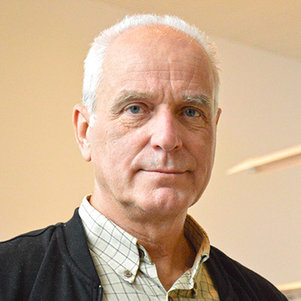Hans Kuiper
Exactly how polluted are our cities? What sources contribute to this and to what extent? Thanks to the range of instruments we now have in space, we can monitor the Earth increasingly effectively. “That's a very positive development”, believes Hans Kuiper, assistant professor in Space Instrumentation Systems Engineering, “because it's high time we focus on sustainability. Developing the technology that can help us achieve that can only be welcomed.”
Alongside his position as assistant professor, Kuiper also works as a senior systems engineer, research manager and high-tech consultant in TU Delft's Space Engineering department. He developed his broad academic grounding in a thirty-year career in the high-tech industry, working at Philips Research, ASML and Fokker Space (now ADS Leiden). “I am a bridge builder between academic topics and their realisation in the high-tech industry. That's my fundamental challenge. I work across multiple disciplines: between faculties, and with numerous external parties, including TNO and ADS.”
His core area is space instrumentation in the broadest sense of the word. Kuiper is responsible for the main Master's lectures in Space Instrumentation Systems Engineering. “We've adopted an original approach to organising the lectures, with a laboratory course in optical design and various external speakers. Students simulate objects that can really fly, such as the Hubble space telescope, to test their limits.” Kuiper started out as a physicist: “Applied physics in space is fascinating. It's thrilling when something that you design and test actually works.”
Kuiper is coordinating three large research projects: a ‘big brother’-like programme for security and justice, an extremely low-flying Earth observation system and a Deployable Space Telescope (DST). “In the latter two projects, we are conducting studies with Dutch industry into flying in very low orbits around the Earth. Currently, around 300 km is the lowest possible, in the future that figure will be just 150 km. If you combine that fact with the unfolding telescope, it will be possible to see and monitor the Earth with centimetre-level accuracy!”
The state-of-the-art technology we are developing here for Earth observation will raise people's awareness of the need for sustainability.
Hans Kuiper
Kuiper is also working on Attitude Determination and Control Systems (ADCS). The aim of these is to stabilise spacecraft attitudes and orient it in a specific direction. “If you place a camera on a spacecraft at an altitude of 20,000 km, the slightest movement is enough to blur the image. This means that it's essential to stabilise the platforms, but it's also very complicated. My field of research is at the cutting edge: developing instrumentation needs to go hand-in-hand with ADCS systems in order to achieve good results.”
Boundless environmental pollution
The boundless waste of energy and environmental pollution in modern society annoys him enormously. “I'm glad that the state-of-the-art technology we are developing here for Earth observation is raising people's awareness of the need for sustainability. We cannot all live like Tibetan monks, but we do need to be environmentally aware.” The recently-launched Tropomi Earth observation instrument provides the most accurate picture ever of air quality and climate. “It shows how polluted individual cities are, enabling us to monitor the impact of environmental policy. Polluters no longer have anywhere to hide and politicians cannot deny that the problem exists.”
Kuiper was closely involved with the pioneers of Tropomi and is now working on miniaturised versions of instruments. This involvement with wider society makes his work even more fascinating. “I'm convinced that a university should exist to serve society. We need to forge strong links with high-tech industry, while maintaining academic freedom. Otherwise, universities have nothing to add.”
He sees his students as liquid gold. “The new generation is enormously interested in bottom-up systems engineering, in other words: gaining an overview of numerous subsystems and using that as a basis for building highly complicated systems. The result could be a tunnel, or an innovative application in space.” Kuiper is a firm advocate of collaboration. “I nurture students and combine their forces in project teams in order to work on topics that are of benefit in high-tech areas. The result is very much a win-win situation. I particularly enjoy working within the dynamic of two different worlds.”
In his free time, Kuiper and his brother are developing a solar concentrator: a pack of solar cells fitted with a mirror construction to shine additional light. “It can produce as much energy as really large solar panels, but it gets boiling hot. Ultimately, it is all about intelligent cooling.” For environmental reasons, he almost always travels by train. “Just like space travel, the environment transcends all cultures. All of us need to work together to manage the Earth. I see it almost as a religious mission.”


